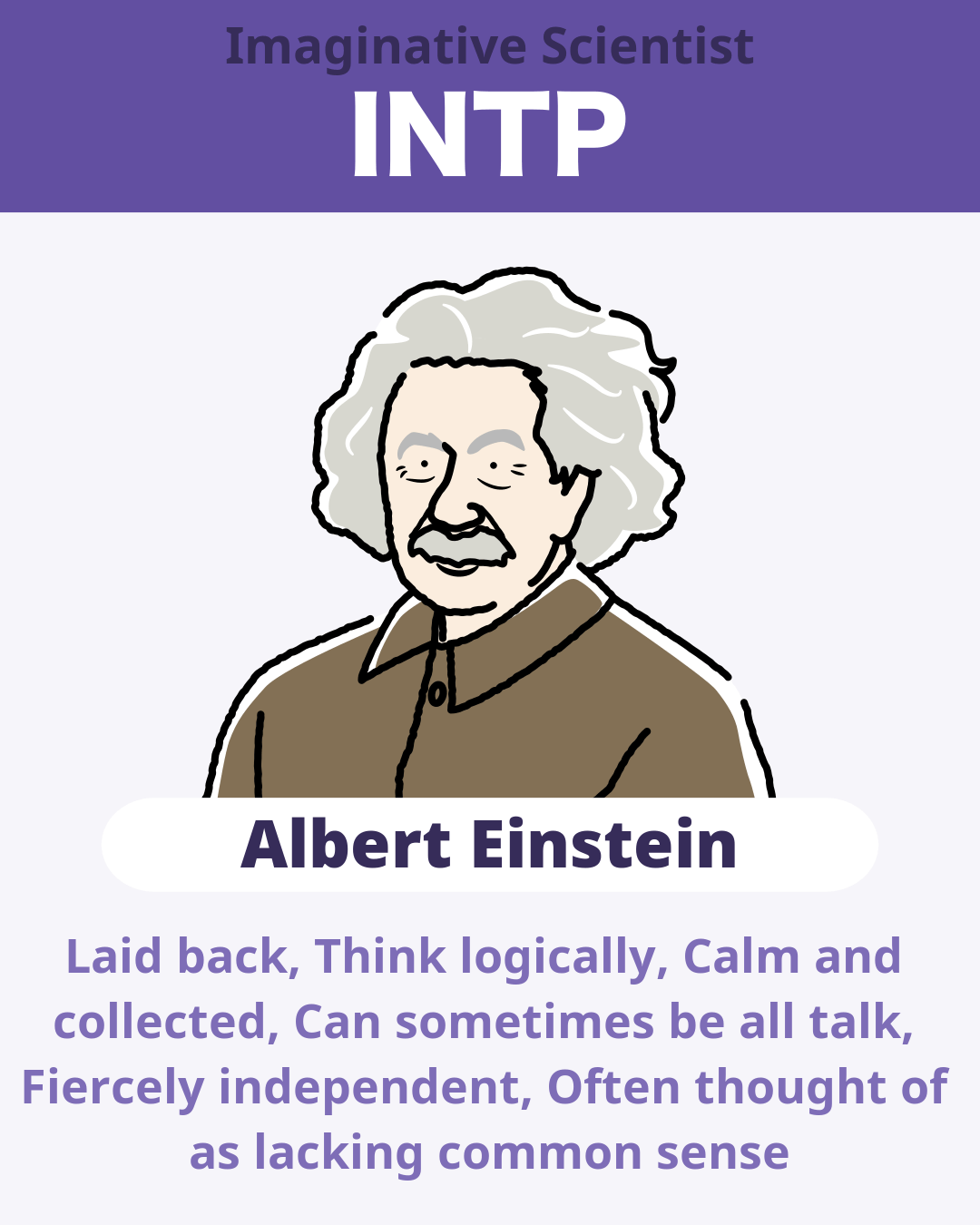
People with the INTP personality type, also known as the Logician personality type, are research-oriented, excelling at thinking about the nature of things and solving difficult problems. People around INTPs admire them for their intelligence and unique ideas. They are independent and can respond calmly and unhurriedly to any situation. They are quiet and reserved, preferring to think about complex issues alone rather than communicate with others, and feel stressed when talking to others, unless the conversation is logical with a clear purpose and rationale. Because of their perfectionist and demanding nature, INTPs easily hone in on the shortcomings of others and can be critical of them. They are not good at routine work and tend to try and pass on tedious tasks to others.





| Ranks | Types | % | |
|---|---|---|---|
| 1 | INFP | Vincent van Gogh | 13% |
| 2 | ENFP | Anne Frank | 11% |
| 3 | ISFP | Mozart | 8% |
| 4 | INTP | Albert Einstein★ | 8% |
| 5 | INFJ | Nightingale | 8% |
| 6 | ESFJ | Andrew Carnegie | 7% |
| 7 | ISFJ | Mother Teresa | 7% |
| 8 | ESFP | Marie Antoinette | 6% |
| 9 | ENTP | Thomas Edison | 6% |
| 10 | ENFJ | Joan of Arc | 5% |
| 11 | ISTJ | Sigmund Freud | 4% |
| 12 | ISTP | Spartacus | 4% |
| 13 | INTJ | Leonardo da Vinci | 4% |
| 14 | ESTJ | George Washington | 3% |
| 15 | ESTP | Columbus | 3% |
| 16 | ENTJ | Napoleon | 3% |
The science of personality types is based on putting people into different psychological groups based on their likes and dislikes and how they act. Katherine Cook Briggs and Isabel Briggs Meyers developed the 16 basic personality types, which help people understand themselves and each other better.
INTP is a rare personality type, and because they are quiet and think things through, they can feel alone and not understood. If you are an INTP or have a loved one who matches this description, learning more about the personality type can help you talk to each other better and strengthen your relationships.
The Myers-Briggs Type Indicator is a personality theory that sorts people into one of 16 personality types based on how they rate themselves. The MBTI is based on the work of Carl Jung and was first made in the 1960s. The MBTI is still very popular in institutions and career planning, and it has been the basis for several other personality theories that use the same basic structure.
Today, many psychologists criticize the MBTI's oppositional nature because it puts people into different types (introvert vs. extrovert, for example). Many modern psychologists see these behaviors as being on a spectrum, with everyone falling onto the same continuum instead of being fundamentally different.
The I in INTP stands for introversion, where you focus your attention and get your energy. Introverts like to think about how they feel, what they've done, and what they think about things. Before they speak or act, they think about what they want to say or do. They like to be alone or with just one or two close friends. Large groups of people and a lot of activity can be tiring for them.
The "N" in INTP stands for "intuition," which shows how you like to learn new things. A person with an intuitive personality is sensitive to ideas, patterns, and abstract ideas. They are also good at thinking through theories and understanding their meaning.
When they are alone and have a lot of time to think about things, they often find new patterns, principles, and ideas.
They think in images and symbols and are interested in the future and new opportunities. They can see the big picture and sometimes recollect impressions and metaphors better than facts and details.
The "T" in INTP stands for "thinking," which is how you like to make choices. Smart people would rather make decisions based on their core beliefs and values than on specific situations or points of view.
They examine the pros and cons and try to be logical and consistent. They make decisions that aren't based on anyone in particular and can always be used for everyone. They try not to be swayed by their feelings or what others think and want. They desire to be fair and honest, which makes them seem uncaring and cold.
The P in INTP stands for perceiving, which is how you act in front of others. A person with a discerning personality type would rather stay flexible, understand the world, and adapt to it than try to organize or control it.
Because of this, they are open, quick, and casual, and they can always seem disorganized or unsure of what to do. They are quiet, thoughtful, and like to work alone, coming up with ideas and solutions. Even though they may know many people, they tend to make few close friends and seem distant.
The INTP is great at thinking logically. They look for patterns, rules, and underlying truths in everything they do and see. They dig deeper and look for information that isn't biased. Because they want to know more, they often get lost in their thoughts or unexpectedly look for new ideas and information.
As introverts, INTPs don't have a strong need to bounce ideas off of others or get encouragement and backing from others. They are often happy to read, think, and evaluate independently. When they are alone and have a lot of time to think about things, they often find new patterns, principles, and ideas. They aren't afraid to push for novel concepts and ways of doing things, even if it upsets the habits and routines of others.
An INTPs logic and independence make them very objective. Instead of just stating their preferences in a given situation, they think about generalizations that apply to all situations. They say what they think without bias or sway and make decisions without being affected by them.
An INTP is loyal to near friends and family because of their consistency and morality. They care a lot about their few close relationships and won't let anyone talk badly about the people they care about.
Because INTPs think about and analyze everything in depth, they tend to be perfectionists because they can always think of ways to improve something. They can be unhappy with themselves and other things that don't live up to their ideals. They can be very hard on themselves and others, and it can seem like they can't be pleased.
Because INTPs are so independent and logical, they often don't care about how other people feel. They don't feel promoting peace and unity is important and can be rude and argumentative sometimes. They don't care about feelings, traditions, conventions, or good manners, so they often say things bluntly and insensitively.
This can make it hard for an INTP to get along with other people. If they don't like a rule, custom, or expectation because they think it's unfair or makes no sense, they can argue strongly against it without being polite or diplomatic. Because they don't feel that it's important to promote peace and unity, they are occasionally rude and argumentative.
The INTP's tendency to get lost in their thoughts and do their own thing can cause them to feel disconnected and alone. People may find it hard to get to know an INTP, and they may find it hard to connect with other people.
The truth is that an INTP seeks interaction and doesn't mean to be rude or harsh. They just don't have many people skills and don't always understand how crucial it is to learn them. An INTP must find a way to make a few deep, important connections with others. This can mean learning how and where to show affection, value their own and other people's feelings, and communicate better.
The INTP personality type is driven by solving difficult problems and reaching difficult goals. They like to look carefully at problems or ideas to get a clear understanding and develop new ways to solve them. Their ability to find patterns makes it easy for them to spot differences.
They don't like being tied down by rules and red tape, especially regarding their ideas. People with INTP personalities can remember and understand a lot. They do well in nontraditional work settings, alone or with a small group. For an INTP, the only way to find a solution to a complicated problem is to learn more about it.
People with INTP personalities like to work with people they think are smart, capable, and logical. They do their best work when they are part of a team that gives them the freedom to think cautiously about how different things work and come up with new ideas. They like calm, conflict-free workplaces and would rather work with people as equals than in a hierarchy.
INTPs are known for having trouble finding and keeping loving relationships, which makes them feel even more alone and disconnected. Here are some things INTPs can do to improve their relationships:
New things challenge our expectations and ways of thinking, forcing us to evolve and grow. INTPs are open to fresh knowledge but often avoid new experiences, making them feel even more alone.
INTPs should force themselves to try new things, especially involving other people and the senses, and keep their minds and hearts open to new learning and communication methods. This tends to help an INTP learn how to get along with other people and become more fun.
A great way for an INTP to acquire the connection they need is to make friends and relationships with other introverts. But introverts are known to have difficulty meeting new people and making connections.
INTPs find it hard to hear and understand how other people feel, and they also find it hard to accept and talk about their feelings. Active, thoughtful listening can help you improve both skills and is also necessary for healthy relationships.
The INTP is a rare type of person. Another reason Thinkers can feel so alone is that most people don't know how to deal with people like them. INTPs comprise only 3-5% of Americans and 1-3% of women. As you might expect, many famous mathematicians and scientists, like Albert Einstein and Rene Descartes, have the INTP personality type. Some other good jobs for an INTP are:
An INTP needs a job where they can pursue their thoughts and ideas, find and test their solutions, and work in their way. This is true no matter what field they go into. Also, their weakest work skill is communicating with large groups, so they usually won't be happy in jobs requiring teamwork, collaboration, or public speaking.
Even though it's important to find a job that plays to our strengths and lets us grow, the INTP will be pleased as a person if they try to balance their ability to think inwardly. Check out our guide to the 16 personality types if you are new to the MBTI and personality type theory.
And if you're an INTP or know one, you should do things highlighting their strengths and learn skills that make up for their weaknesses. The INTP has a very strong personality and can be a great friend and lover if you know their personality traits and plan for them.